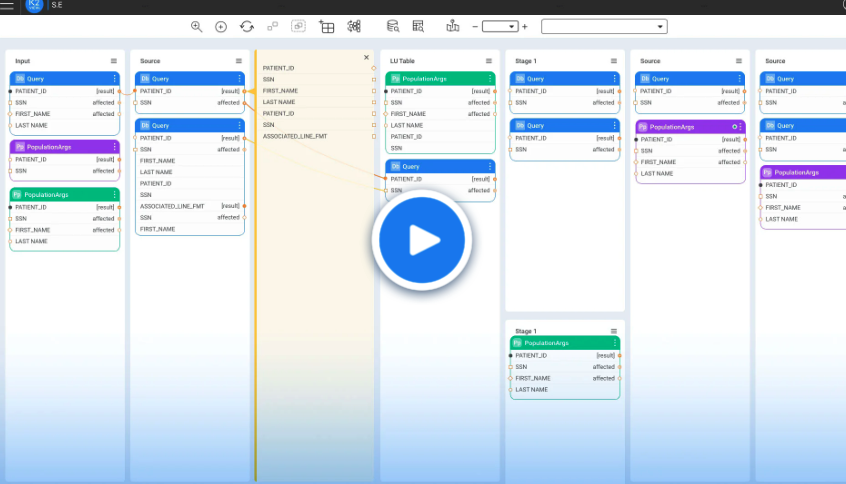The top test data management tool automates test data delivery in complex environments, by combining a business entity approach with Micro-Database technology.
Table of Contents
Why Test Data Management
Test data management refers to the systems and processes that Quality Assurance (QA) and application teams use to provision test data.
Test data is data which has been specifically identified for use in tests, typically of a computer application. While some test datasets may be used to confirm expected outcomes, others may be used to check the app’s response to unexpected inputs.
Test data management software are software platforms that create, manage, secure, and deliver this data automatically.
For DevOps leaders and testing teams, on-demand access to high-quality test data is critical. It’s the key to shift-left testing and agile software delivery, which enable organizations to churn out more apps and features faster, and with fewer defects. In today’s high-speed digital era, maintaining a competitive pace for software development is a must.
Despite this, many companies continue to underinvest in test data management. As a result, they undermine their own efforts to compete and innovate.
With the right tool, companies can consistently and reliably provision high-quality test data to support fast-pace, agile development. Keep reading for a list of the top test data management tools for 2025.
What is the Business Impact of Test Data Management?
There are two primary business considerations for investing in top test data management tools:
-
Rapid provisioning of data unleashes new levels of speed
The shift to agile development and DevOps, with an emphasis on continuous integration and continuous development (CI/CD) pipelines enables businesses to accelerate software delivery. However, shift-left testing – a cornerstone of agile development – is impossible unless test data provisioning can match this pace. With the right test data tool, DevOps and testing teams can get their hands on reliable, high-quality test data whenever they need it. -
Compliance with data privacy and protection regulations is a top priority
Today, The consequences of non-compliance include steep fines (to the tune of millions of dollars), class-action law suits, and brand damage. In the worst-case scenario, an actual data breach can wreak financial havoc, and completely erode customer trust. DevOps teams that manually provision test data – without an adequate means of anonymizing sensitive information – expose their companies to these risks. Data masking, tokenization, synthetic data generation, and other means of data anonymization, are standard features of top test data management tools.
Top Criteria to Look For in a Test Data Management Tool
When evaluating test data tools, make sure you choose the solution that supports:
-
Automation and self-service functionality
Your test data tool should allow DevOps and QA teams to eliminate manual processes when setting up new data testing environments, such as initializing target databases, configuration, and validation checks, with test data automation. With sufficient levels of automation in place, authorized testers can provision test data themselves, without having to rely on backlogged IT/DevOps. -
Data integration
With production data fragmented and dispersed across multiple enterprise systems, extracting complete and harmonized data for testing is a major challenge. Make sure your test data tool supports data integration with all relevant source and production systems, so it can extract complete test datasets. -
On-demand data roll-back
Your test data tool should enable on-demand roll-back to previous datasets, without impacting the data currently involved with other tests. -
Data masking
Data masking is a non-negotiable requirement for any test data tool. The solution you choose should include a wide variety of data masking techniques out-of-the-box while maintaining data integrity, and adhering to organizational security and privacy policies. Masking data like PII, and unstructured data masking, should also be requirements. -
Synthetic data creation
Testing teams can’t always extract a sufficient volume of test data from production datasets. A test data tool that is capable of synthesizing test data based on real production data is invaluable to software teams. -
High-speed provisioning
Your test data tool should provide a fast and frictionless path, from multiple source systems, to multiple testing environments. Individual testers should be able to upload, adjust, and delete test sets manually, or automatically using CI/CD integration.
Top Test Data Management Tools for this Year
-
K2view

K2view developed an entity-based test data management approach that hastens test data delivery in highly complex, enterprise environments. Its fully automated solution collects all the data related to a particular business entity (such as a customer or order) from all underlying sources, masks, Test data is maintained in a test data warehouse, accessible to DevOps via an API, and to testers via an easy-to-use web portal. K2view test data management covers a wide range of data anonymization tools, including data masking tools, data tokenization tools, and synthetic data generation tools. Its self-service approach allows anyone to provision test data, on a single, automated platform, regardless of the number of systems, testing environments, or technologies.
-Dec-26-2024-01-43-38-3744-PM.png?width=860&height=408&name=image%20(5)-Dec-26-2024-01-43-38-3744-PM.png)

-
Broadcom

Broadcom's Test Data Manager allows DevOps and testing teams to locate, secure, and provision “fit for purpose” test data. Its profiling feature quickly locates Personally Identifiable Information (PII) across multiple data sources, with the help of a heat map that not only identifies where PII resides, but also classifies it by severity level. Broadcom enables synthetic test data generation, and allows for virtual copies of test data, on demand, to speed up testing. However, according to user reviews, Broadcom’s interface is complex, and does not easily support a self-service approach. -
IBM
IBM’s test data tool provides a single solution to create production-like test environments that reflect business processes. It streamlines testing processes, supports agile DevOps, and protects sensitive data with masking. With an emphasis on data governance, it provides a standard method of governing the test data management process and ensures policies and standards are met throughout the lifecycle. The most significant user complaint is lack of integration with key data sources and complexity in self-service test data provisioning. -
Informatica

Informatica Cloud Test Data Management was designed with an emphasis on Salesforce as a source system. It allows DevOps and QA teams to discover, create, subset, and visualize test data during Salesforce development while protecting sensitive data from unauthorized use. It enables automated data discovery, a self-service data warehouse, data masking, and compliance monitoring and reporting. The biggest drawbacks for users are limited data source support, complexity, and implementation costs. -
Delphix

The Delphix test data tool delivers compliant test data on demand. It includes API controls to automatically mask, provision, and version virtual test data for DevOps and QA teams. The Delphix solution works across standard data sources to capture a complete record of data changes, virtualizing the data to target environments. Its main drawbacks include limited set of supported data sources, limited data subsetting and data transformation, and data reservation capabilities. Data virtualization, in the context of test data management, has its many disadvantages. It takes QA teams more time to find and prepare test data. It becomes a single point of failure, when servers are down. And it doesn’t support batch processing very well. -
Datprof

Dataprof’s test data tool has 4 basic features: data discovery, test data automation, data subsetting, and data masking. It allows DevOps and QA teams in smaller organizations to manage and refresh test data across testing environments from one central location. It is less applicable for enterprises with complex, multi-source data environments, and according to user reviews, implementing templates for provisioning test data requires “starting from scratch” each time.
Select Your Test Data Tool Wisely
The right test data tool can empower your company to significantly reduce costs, minimize project delays, and improve software quality. But not all test data management softwares offer the same features, or provide you with adequate security and compliance measures.
By using the criteria above as your checklist, and considering your organization’s most important needs, you can build a truly agile software development life cycle that is competitive, innovative, and reliable.















